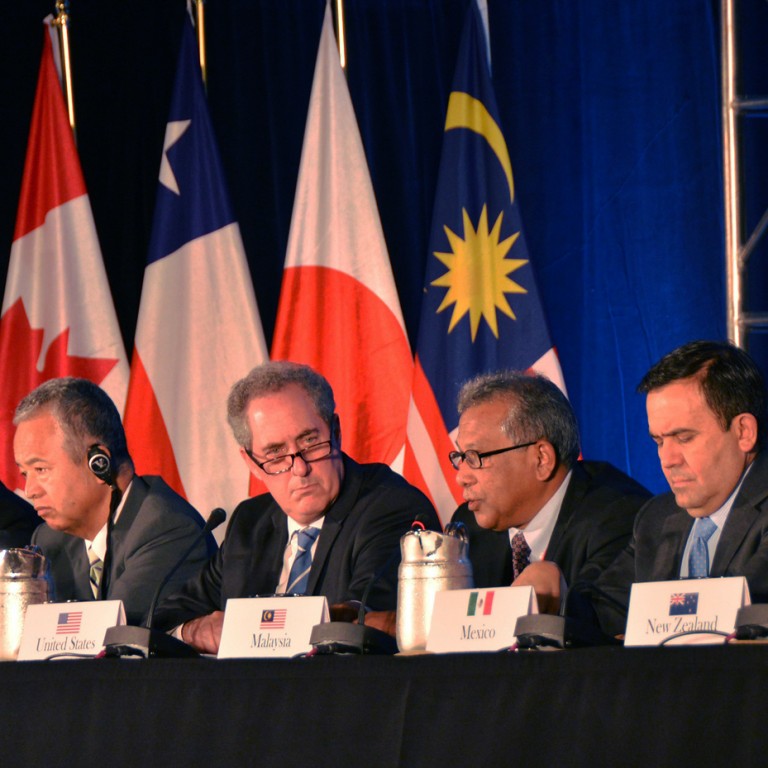
It's not checkmate yet: Beijing to counter US-led Trans-Pacific Partnership trade pact
China to speed up talks on regional accord in face of landmark Trans-Pacific Partnership deal
China will seek to quicken the pace of its free-trade negotiations with other Asia-Pacific economies to counter a mammoth Washington-led trade pact in the region, observers say.
The United States and 11 other countries that in total make up 40 per cent of the world's economy scored a landmark Trans-Pacific Partnership (TPP) deal in Atlanta on Monday.
In response, China - presently excluded from the TPP - was expected to push for the conclusion of its Regional Comprehensive Economic Partnership (RCEP) negotiations by the end of the year, said Peking University professor Wang Yong.
Chinese delegates had, during a ministerial meeting in August, called on the negotiating countries - 10 Asean members plus Australia, India, Japan, South Korea and New Zealand - to "show enough political resolution … to conclude the substantive negotiations" by the end of 2015 to "produce deliverables for the East Asia Summit" in November, according to Xinhua.
The top negotiators will gather in South Korea from October 12 to 16 for the RCEP talks.
China is also in talks with South Korea and Japan for a separate free-trade agreement. The three countries were discussing a possible trilateral meeting of their finance ministers on the sidelines of a meeting of Group of 20 finance leaders in Peru this week, said Japanese Finance Minister Taro Aso.
Chris Brummer, fellow at the US-based think tank Atlantic Council, said there was no doubt the TPP was viewed not only as an economic agreement, but also as "an instrument of foreign economic policy".
"It's hard not to expect some inclination to accelerate China's own trade agenda," Brummer said. "The question is, of course, to what extent China's economy will support it in the short term."
Another US-based think tank, the Council on Foreign Relations, described the TPP as "a vivid demonstration that the US is determined to compete on the Asian economic playing field" in the wake of "growing Chinese economic power and geopolitical coercion in Asia". Once approved by the member states' lawmakers, the trade pact will reshape industries and change the cost of products by reducing and eliminating tariffs on almost 18,000 categories of goods.
Trade diversions could be the cost to China of not joining the pact, said Joshua Meltzer, senior fellow of Brookings Institution.
It's hard not to expect some inclination to accelerate China's own trade agenda
"Countries and businesses will reorient supply chains … to take advantage of the new market access opportunities to be created among TPP members."
For their products to qualify for tariff cuts in the pact, countries will also have to source a certain percentage of imports from TPP members, Meltzer said.
That could mean countries like Vietnam that used to rely largely on Chinese imports would turn to TPP members instead to benefit from the deal.
Wang said the TPP's more immediate impact on China was investment diversion, with investors becoming less confident in the Chinese economy, whose trade growth was already showing signs of slowing.
A Ministry of Commerce spokesman yesterday said China was open to anything that would boost the integration of the regional economy.
"There has been a shift in Beijing's attitude towards the TPP with the new leadership," said Wang. The pact was now viewed not only as a threat but also as an incentive to drive China's economic reforms, he said.
China is still far from reaching TPP standards, which include restrictions on favourable treatment granted to state-owned enterprises - the dominating performers in the Chinese market.
"If China doesn't join the TPP because its standards prove too high, that may also be a reflection … that China's economic reforms are going to be a problem," Meltzer said.
